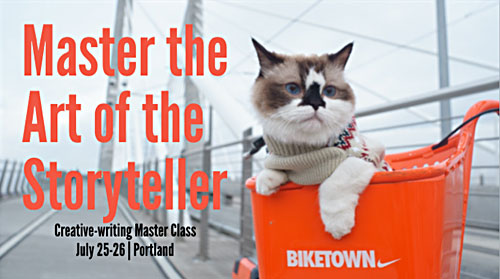Gain color and insight you can’t get any other way
You’ve heard about MBWA, or management by walking around? Try WBHA, or writing by hanging around — going to the scene to observe.

Observational research is the most overlooked reporting tool there is. Which is a shame. Because firsthand observation gives your copy color and insight that you can’t get any other way.
Observational research means that you, the writer, experience the event or product or procedure so you can re-create the experience for your readers.
Covering a new roller coaster? Get on that sucker and ride it. Doing a piece on a new medical procedure? See if you can get into the operating room. Writing about a new line of chocolates? You haven’t really done your job until you’ve sampled a box or two.
The first step to good description is to find concrete, compelling details. Here are 7 tips for getting the goods:
1. Be there.
Hang up the phone, back away from the keyboard and go to the scene to observe. You won’t come up with good description if you never leave your desk.
So:
- Spend a day (or an hour) with your subject matter expert as she goes about her regular business.
- Ask for a demonstration. Get the subject matter expert to show you how she found the computer glitch or otherwise demonstrate parts of the story for you.
- Take a tour with the subject matter expert. Let the plant manager show you “how things work around here.”
- Find an action setting. Put yourself and your subject matter expert in a situation that reveals something about the topic. When I profiled a customer-service guru, for example, I took him to a white-tablecloth restaurant where I could observe him observing the service.
- Watch the subject in action, then talk. Be on hand while the surgeon performs surgery, for instance, then ask questions afterward.
Wherever you go, get out of your office.
2. Tune into your five senses.
Once you’ve left your desk for someplace more interesting, report with all your senses.
Remember: You have five.
Different senses affect readers differently. If you want to foster memory and emotion, for instance, focus on the sense of smell. The smell of Lipton’s tea still transports me back to my grandmother’s kitchen, circa 1972.
From the tick-tick of the heart-beat monitor to the “Jaws” theme song, sound can build tension in your readers.
You can use sound, on the other hand, to build tension. From the tick-tick of the heart-beat monitor to the “Jaws” theme song, sound can create stress in your readers — stress you can “break” by showing how your organization, product or service can solve the problem.
How can you tune in to all five senses? Try this exercise recommended by Perry Garfinkel in Travel Writing: For Profit and Pleasure. Ask yourself:
“Here and now I hear what, see what,
smell what, feel what, taste what?”
That way, you’ll capture, according to Kevin McGrath, assistant metro editor at The Wichita Eagle, “not just sights but sounds, smells, actions, reactions, interactions, bits of conversation, facial expressions, posture, clothing and the state it’s in (crisply pressed, badly wrinkled, sweaty, dirty, raggedy, shirttails hanging out etc.), how things look in relation to their surroundings, etc.”
You’ll see how your subject matter expert stands, sits and gestures and what she keeps on the bulletin board.
“Does a clock on the wall of a high-powered executive tick-tock relentlessly, like a metronome for his pressure-packed career?”
— David A. Fryxell, former editor of Writer’s Digest
You’ll notice the sounds the machines make in different parts of the company’s plant, and how your subject’s voice tone changes when he’s feeling stressed out, passionate or joyful.
And you’ll use your senses of taste, touch and smell to re-create the scene for your readers.
3. Compare it.
Metaphors, similes and analogies can help you describe what you’ve experienced. Ask:
“What’s it like?”
One key to great copy: Be there.
Being on the scene can yield great anecdotes and description. That will spark reader interest in a way that virtually nothing else can.
How do you use observational research in your writing?
“The question is not what you look at, but what you see.”
— Henry David Thoreau, American author and philosopher
Want to stimulate some brain activity around, say, your CEO’s latest strategy or that brilliant Whatzit you’ll be releasing later this month? Description is the answer. Learn how at our Master the Art of the Storyteller Master Class on July 25-26 in Portland. You’ll learn to make your readers’ brains light up.
Don’t miss out: Just 8 tickets left.
|
